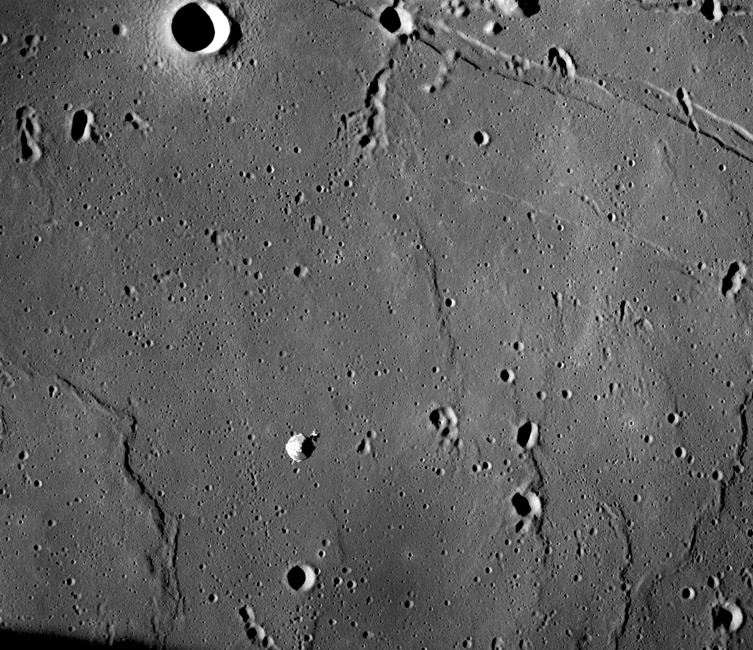Difference between revisions of "July 20, 2011"
(Created page with "__NOTOC__ =One Small Spaceship for Man= <!-- ws:start:WikiTextHeadingRule:0:<h1> --> <!-- ws:start:WikiTextLocalImageRule:6:<img src="/file/view/LPOD-Jul20-1...") |
|||
| Line 4: | Line 4: | ||
<!-- ws:start:WikiTextHeadingRule:0:<h1> --> | <!-- ws:start:WikiTextHeadingRule:0:<h1> --> | ||
<!-- ws:start:WikiTextLocalImageRule:6:<img src="/file/view/LPOD-Jul20-11.jpg/242031033/LPOD-Jul20-11.jpg" alt="" title="" style="width: 600px;" /> -->[[File:LPOD-Jul20-11.jpg|LPOD-Jul20-11.jpg]]<!-- ws:end:WikiTextLocalImageRule:6 --><br /> | <!-- ws:start:WikiTextLocalImageRule:6:<img src="/file/view/LPOD-Jul20-11.jpg/242031033/LPOD-Jul20-11.jpg" alt="" title="" style="width: 600px;" /> -->[[File:LPOD-Jul20-11.jpg|LPOD-Jul20-11.jpg]]<!-- ws:end:WikiTextLocalImageRule:6 --><br /> | ||
| − | <em>Apollo 11 image AS11-37-5447 from [mailto:tychocrater@yahoo.com Chuck Wood]</em><br /> | + | <em>Apollo 11 image AS11-37-5447 from [http://next.nasa.gov/alsj/a11/images11.html#Mag36 Apollo 11 Journal Multimedia]</em><br /> |
| + | <br /> | ||
| + | Where were you 42 years ago? I had just returned to the US from two years in Kenya as a Peace Corps volunteer, and was in Boston visiting my friend Clark Chapman, a graduate student at MIT. Clark and I sprawled across his living room floor closely staring at the TV and listening to every instant of the Apollo 11 landing. We didn't see this photo until later after the crew safely returned home. It shows the command module Columbia looking about the same size as the crater later named [http://next.nasa.gov/alsj/a11/A11LBL5447.jpg Collins] just below it. Moltke, a 6 km wide crater that we can see with backyard telescopes is visible at top right near the Hypatia Rilles, or [http://www.lpod.org/?m=20070910 US Highway 1] as the astronauts called it.. The [http://the-moon.wikispaces.com/West Cat's Paw] cluster of craters to the right of the Columbia, like most of the irregular craters seen here, was formed by ejecta from Theophilus. Armstrong and Aldrin landed at the last moment at an inconspicuous spot between the command module and the Cat's Paw. LRO can see [http://www.nasa.gov/mission_pages/LRO/multimedia/lroimages/lroc_200911109_apollo11.html it] but we can't from Earth. <br /> | ||
| + | <br /> | ||
| + | <em>[mailto:tychocrater@yahoo.com Chuck Wood]</em><br /> | ||
<br /> | <br /> | ||
<strong>Related Links</strong><br /> | <strong>Related Links</strong><br /> | ||
Revision as of 20:45, 1 January 2015
One Small Spaceship for Man
Apollo 11 image AS11-37-5447 from Apollo 11 Journal Multimedia
Where were you 42 years ago? I had just returned to the US from two years in Kenya as a Peace Corps volunteer, and was in Boston visiting my friend Clark Chapman, a graduate student at MIT. Clark and I sprawled across his living room floor closely staring at the TV and listening to every instant of the Apollo 11 landing. We didn't see this photo until later after the crew safely returned home. It shows the command module Columbia looking about the same size as the crater later named Collins just below it. Moltke, a 6 km wide crater that we can see with backyard telescopes is visible at top right near the Hypatia Rilles, or US Highway 1 as the astronauts called it.. The Cat's Paw cluster of craters to the right of the Columbia, like most of the irregular craters seen here, was formed by ejecta from Theophilus. Armstrong and Aldrin landed at the last moment at an inconspicuous spot between the command module and the Cat's Paw. LRO can see it but we can't from Earth.
Chuck Wood
Related Links
Rükl plate 35
COMMENTS?
Click on this icon File:PostIcon.jpg at the upper right to post a comment.




